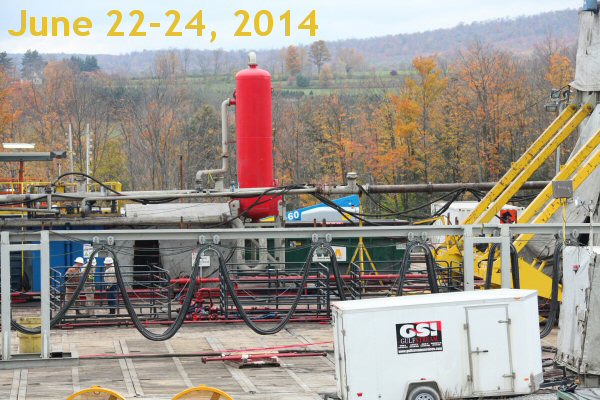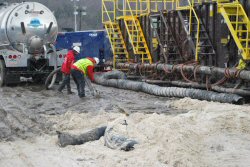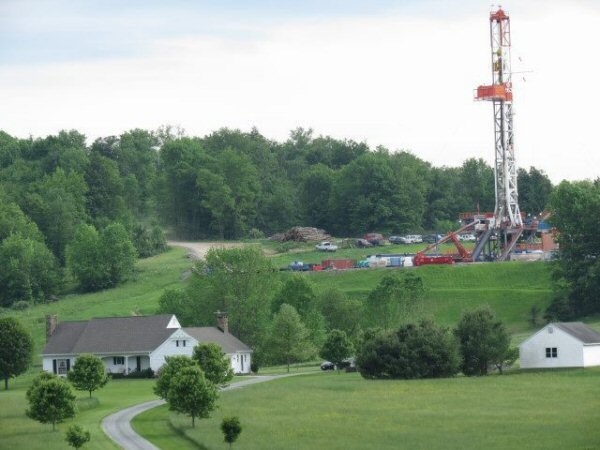Journalists are eligible for free email subscriptions to SEJournal, including TipSheet, WatchDog (on access issues) and more.
 |
| Deck of a rig near Warrendale, Pa. Photo credit: Gary F. Clark; © Walter M. Brasch, author, Fracking Pennsylvania: Flirting with Disaster. |
The concept is fairly simple — inject fluids into rock formations under enough pressure to crack the rock and release the natural gas and oil hidden within. But the politics surrounding hydraulic fracturing, otherwise known as ‘fracking,’ and shale development in general, are anything but simple.
Often shrouded in secrecy, shale gas and oil development, along with pipeline safety, have become important issues for journalists in most, if not all, of the U.S. This workshop will help journalists understand the legal, scientific, health and economic issues surrounding shale gas and oil development, and give them the context needed so that they can better inform their communities about these important topics.
The Society of Environmental Journalists invites U.S. journalists and educators to apply for fellowships to attend our McCormick Specialized Reporting Institute on Shale Gas and Oil Development. The deadline for applying is April 15, 2014, at midnight local time.
 A limited number of journalists and academics working in the United States will be selected to participate in this three-day intensive workshop, to be held June 22-24, 2014 at Carnegie Mellon University in Pittsburgh, PA. Funding provided by the Robert R. McCormick Foundation will cover all transportation, housing, food and tuition costs.
A limited number of journalists and academics working in the United States will be selected to participate in this three-day intensive workshop, to be held June 22-24, 2014 at Carnegie Mellon University in Pittsburgh, PA. Funding provided by the Robert R. McCormick Foundation will cover all transportation, housing, food and tuition costs.
Travel Fellows
- Monique Ching, San Angelo Standard-Times
- Kristy Foster Seachrist, Farm and Dairy Newspaper
- Sharon Friedman, Lehigh University
- Terri Hansen, Indian Country Today
- Mark Jaffe, Denver Post
- Stephanie Joyce, Wyoming Public Radio
- Mike Lee, Energy Wire
- Jennifer Loren, KOTV-TV
- Karie Lydersen, Midwest Energy News
- Bobby Magill, Climate Central
- Bernardo Motta, Bridgewater College
- Miles O'Brien, Miles O'Brien Productions
- Kit Stolz, Freelancer/VC Reporter
- Dan Telvock, Investigative Post - Buffalo
- Valerie Volcovici, Reuters
- Tim Wheeler, The Baltimore Sun
Local Fellows
- Laura Arenschield, Columbus Dispatch
- Jon Bowermaster, Writer/Filmmaker
- Bob Downing, Akron Beacon Journal
- Reid Frazier, Allegheny Front
- Brendan Gibbons, Scranton Times-Tribune
- Tim Puko, The Wall Street Journal
- More to be announced
The Institute begins on Sunday evening, June 22 at 5pm with a welcome session, and concludes on Tuesday, June 24 at noon, following a visit to a local fracking site.
 |
| Workers, without HazMat protection, clean up fluids near Lathrop Twp., Pa. Photo credit: Frank Finan; © Walter M. Brasch, author, Fracking Pennsylvania. |
Workshop participants will:
- Gain an overview of shale gas and oil development
- Discuss the policy issues involved with shale development
- Hear from top legal experts about the laws surrounding development
- Find out the latest on pipeline safety
- Learn from leading experts what is and isn’t known regarding the health and environmental effects of shale development
- Discuss with other journalists and editors best practices for such coverage, and hear from those journalists who have been on the front lines of shale development coverage
- Tour a fracking facility
Participants will learn from the nation’s top legal experts in this field, engineers, journalists on the front lines of shale development coverage and others who will contribute to understanding and coverage. This workshop will be relevant to anyone covering, or anticipating covering, shale development. Journalists from all media are encouraged to apply, along with academics working in journalism programs.
Portions of the workshop will also be streamed live from Carnegie Mellon’s Distributed Education Center, an interactive classroom where much of the workshop will take place. This program will also dovetail with a “Shale Country” Institute traveling expedition, Jun 24-28, 2014, being organized separately by the Institutes for Journalism and Natural Resources (IJNR). (While IJNR's Shale Country is still in active stages of planning, journalists attending the Institute can expect to visit Buffalo, New York to talk about natural gas transport and pipelines; the Allegheny National Forest to discuss hydraulic fracturing on public lands; sites near Youngstown, Ohio, where a recent spate of earthquakes led to a pause in fracking while authorities pinpoint the cause; and the Finger Lakes of New York, where a contentious proposal is brewing to use abandoned salt mines for natural gas storage. Applications for IJNR's Shale Country Institute are due May 2nd.)
Following SEJ's Pittsburgh workshop, a webinar will be produced in coordination with The Poynter Institute’s News University to improve coverage on shale development using information produced at the event. Date and details on the webinar will be announced later.
WHO: Applicants are limited to journalists and academics working in the United States; freelance journalists are encouraged to apply. Preference will be given to those most likely to apply their learning to robust coverage of shale gas and oil development or teaching courses through which knowledge can be shared.
WHAT: Fellowships for a three-day workshop on shale gas and oil development
WHEN: June 22-24, 2014
WHERE: Carnegie Mellon University, Pittsburgh, PA
Deadline to apply for the McCormick Specialized Reporting Institute was April 15th.
This workshop will be a hands-on training. Participants will be expected to contribute regularly to the discussion. Some homework will be required before attending. Participants are expected to expand their coverage of fracking and other aspects of shale gas and oil development following the workshop.
For questions, contact:
Dale Willman
518-583-7247
dale@SaratogaWire.com
 |
|
Well in northeastern Pennsylvania. Photo credit: Vera Scroggins; © Walter M. Brasch, author, Fracking Pennsylvania.
|












